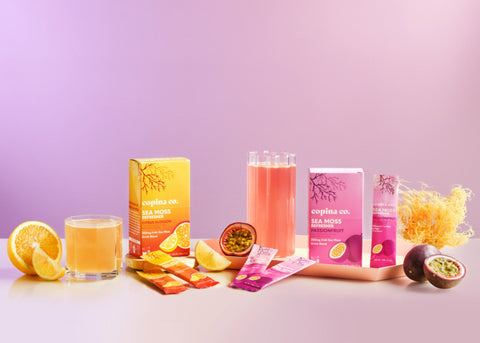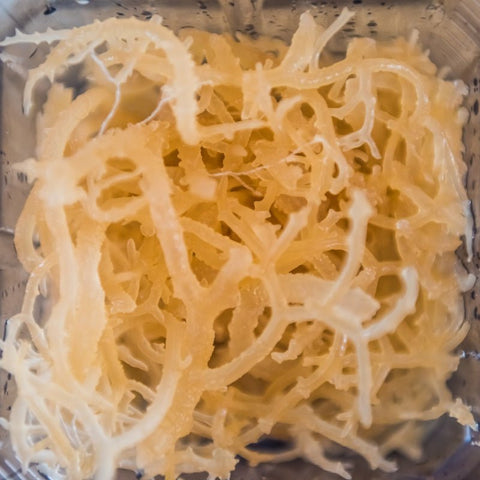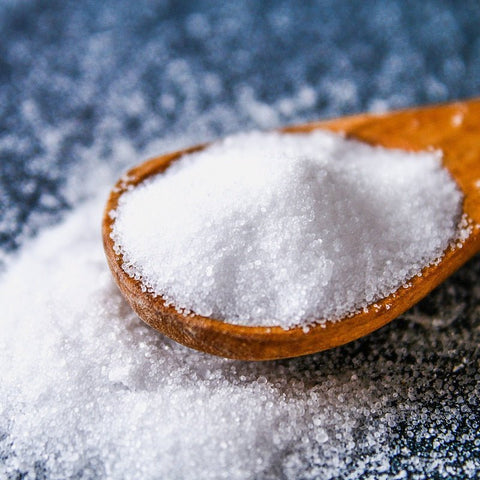So, what is collagen?
In order to understand what you are supplementing, let’s take a look at what collagen is in the body.
Collagen is the most abundant protein found in the body. This structural protein (which is made up of amino acids) is found in the bones, muscles, tendons, and skin, and is essentially the glue that holds the body together and keeps it functioning. Throughout the body, collagen works as a building block. It also supports the skin by strengthening, hydrating, and maintaining elasticity – basically, it keeps your complexion looking glowy and youthful!*
A quick science lesson: collagen synthesis occurs naturally in the body. In order to make collagen, the body needs amino acids, as well as vitamin C, zinc, and copper. The collagen synthesis process primarily occurs within and outside of fibroblasts, a network of collagen-producing cells. Fibroblasts are found in the skin, tendons, and other connective tissues in the body. Collagen is found throughout the body, and works as a building block for the skin, hair, bones, muscles, ligaments, and tendons. There are 28 known types of collagen in the body, but around 80% to 90% of the collagen found in the body is type I, II, or III.
As far as the skin goes, collagen strengthens, hydrates, and helps maintain elasticity, keeping the complexion looking youthful and glowing. Collagen works in the dermis (the middle layer of skin), helping to form fibroblasts for new cells to grow. Collagen supports stronger hair and nails.

Things That Can Contribute to Collagen Damage
Lifestyle and Environment stress
Pretty much everything affects your skin. It is our body’s largest organ. What you might not know is that things like pollution (yes including air), free radicals, and lifestyle stress can greatly impact collagen production over time. They can reduce skin elasticity and other effects of good-quality collagen production. We’ve previously written about lifestyle factors that can make you experience premature aging and one of them is long-term high-stress lifestyles.
High sugar consumption
Everything is good in moderation of course, but it has been shown that sugar increases the rate of advanced glycation end products also known as AGEs. This can damage proteins which will weak collagen and make it dry and brittle. If you ever are consuming a lot of sugar and find your skin feeling dry later in the week, you might be consuming too much sugar.
Sun exposure
Light exposure is actually really important for a lot of your body’s functions. But ensuring that your skin is well protected from over-exposure is important to make sure there is no UV ray damage to your skin. UV ray damage can be found in the dermis, where it breaks down your collagen and creates abnormal elastin fibers. This is when your skin can rebuild incorrectly which makes wrinkles.
Smoking
The chemicals in tobacco smoke can damage the natural collagen and elastin in your skin. When combined with nicotine it also can restrict blood vessels which affects the delivery of nutrients to your skin. This includes things like oxygen and such.
Natural Aging Process
As you age your body naturally stops producing collagen. This decrease in collagen production can start around the age of 25 and is effecting by other outside circumstances like hormones and lifestyle factors.* Things like menopause or reoccurring bad lifestyle habits can affect your collagen production long term.

Ways you Can Support it
Omega fatty acids
Having a balanced diet that contains protein in the form of fatty acids like Omega-3 and vitamin A is great for your collagen production long term. Vitamin A has an anti-inflammatory effect. Foods high in Omega-3 fatty acids are:
- Hemp seeds
- chia seeds
- ground flaxseeds
- walnuts
- Certain oils like flaxseed, canola, walnut, and soybean
Limiting caffeine and sugar
Limiting caffeine and sugar intake can help your skin’s collagen production.
Hyaluronic acid
Hyaluronic acid can be extremely beneficial when it comes to boosting collagen production in the human body.* It is naturally in our bodies but like collagen, it decreases as we age. Without enough Vitamin C your body cannot gain the full benefits of foods that contain hyaluronic acid. Hyaluronic acid can be found in our Vegan Collagen Boost Blends. This is why serums like hyaluronic acid and Vitamin C can be beneficial to your outer layer of skin, but sometimes is not enough. Supporting your collagen production with our food-grade hyaluronic acid is a great way to potentially aid your collagen production.*
Vitamin C
A well-balanced diet also includes foods rich in vitamin C and amino acids. As stated above, this also can aid your body’s natural collagen production as well as levels of hyaluronic acid. You can supplement Vitamin C or you can eat foods rich in it like citrus fruits, strawberries, and leafy vegetables. Amla berry, which can be found in our collagen boost blends, is rich in Vitamin C.*
Antioxidants
Antioxidants are also super important to help protect your skin against free radical damage. Antioxidants help collagen production but also help make the skin glow.*
Foods rich in antioxidants include:
- Cinnamon
- Yerba mate
- Blueberries
- Green tea (try our Vegan Matcha Collagen Support Blend!)
- Amla Berry
- Tremella Mushroom
- Gotu Kola
Our Vegan Collagen Supports are packed with ingredients that are high in antioxidants. We also have a great list of recipes on our websites from smoothies to energy balls that are packed with antioxidant-rich ingredients! Take a peek at our drinks & lattes section for how you can get your matcha latte game on point.

Aloe vera
Aloe vera has great properties when applied to the skin topically. Check out some of our favorite natural face masks. There are also some new studies that show that supplementing with aloe vera might also help your natural production of collagen and hyaluronic acid.*
Algae
Marine plant ingredients are growing in popularity! Algae is helpful in preventing oxidation in the skin which helps upkeep your elasticity and collagen. Algae can be taken orally but also can be bought in your skincare!
Vegan Collagen Supports
Lastly, another way to help aid your body’s natural production of collagen is our vegan collagen boosters.* Our plant-based blend includes ingredients like tremella mushroom, amla berry, hyluronic acid, and Gotu Kola. Our blend of ingredients helps naturally support your collagen production.* That’s why we sourced and dosed all of our plant botanical ingredients with the help of professional herbalists. What makes our plant-based & vegan collagen boost blends unique is that they support collagen from all angles.* They both fight collagen degradation and promote collagen production.* Each ingredient in our botanical blends has been chosen for its potency and efficacy. Some have been used for thousands of years in Eastern Medicine and Ayurveda and all have real research to back them up. Enjoy the best of plant medicine in your daily routines.

Some ingredients in our vegan collagen support blends that can help your collagen production include:
Antioxidants like the polysaccharides found in tremella fuciformis have amazing skin care benefits and can play an important role in keeping the skin hydrated and healthy.* The tremella fuciformis mushroom may be beneficial to supporting a healthy immune system thanks to the beta-glucans found in its polysaccharides. These beta-glucans have been shown to stimulate the immune system and improve immune function.*The tremella is unique for its ability to retain moisture. Tremella mushrooms can hold up to 500 times their weight in water. Skin that has a higher water content will look more supple, bouncy, and nourished.* Consuming tremella fuciformis can be beneficial for hydrated, nourished skin that feels and looks healthy and glowing.*
Primarily found in sun care, anti-aging products, and supplements, gotu kola promotes collagen production in the skin, reduces stretch marks and scars, and increases antioxidant levels in newly formed tissues. What’s more, it helps firm, tighten, and prevent saggy skin.*
Full of triterpenoids (a compound that helps keep skin tighter and firmer), vitamins B and C, flavonoids (phytonutrients that act as antioxidants to fight off free radical damage), tannins and polyphenol, gotu kola has been found to prevent bacterial growth, promote the production of new skin cells, and enhance the resilience of the skin by calming inflammation.*
Biotin is a helpful mechanism for metabolizing nutrients that can be ingested through vegan biotin supplements.* Here at Copina Co, we made sure to include vegan Biotin in our Plant-Based Collagen Boosts for you to maintain your B7 levels in the body so that you can get health benefits such as stronger nails.* Varying levels of biotin-dependent enzymes have been found in every tissue of the human body. That makes sense, of course. After all, organisms need these enzymes to survive—so we've evolved to make as much biotin as we need. And research suggests that our bodies conserve biotin levels in response to low dietary intake. If we're not absorbing enough biotin from food, we'll do what it takes to get by.
Now wait, does Vegan Collagen Actually Work?
We actually went to bat to make sure our vegetarian collagen supports worked and you can find and see our results from our consumer survey!
Some of our findings included:
- 100% of respondents noticed increased skin hydration in 2 months
- 100% of respondents noticed a difference in overall skin glow in 2 months
- 92.9% of respondents noticed a difference in hair thickness in 2 months
- 92.9% of respondents noticed a difference in nail strength in 2 months
- 100% of respondents noticed a difference in overall skin vibrance and "glow"
Each participant took 2 doses of our Plant-Based Collagen Boost Blends in their diets each day for 8 weeks and reported on the results. Participants completed surveys at the 2, 4, 6, and 8-week marks, reporting if they saw any changes in their hair, skin, and nail health, as well as reporting any changes in how they feel or anything else they noticed as a result of adding the collagen support blends to their routine.

We also share collagen-boosting recipes on our Instagram and Tik Tok every week. We full-heartedly believe in supporting the body from the inside out and love sharing other wellness and health content there as well that can help support you to live your best life (and achieve that #CopinaCoGlow)!
If you liked this blog post, you’d love some of our other wellness-oriented blog posts!










